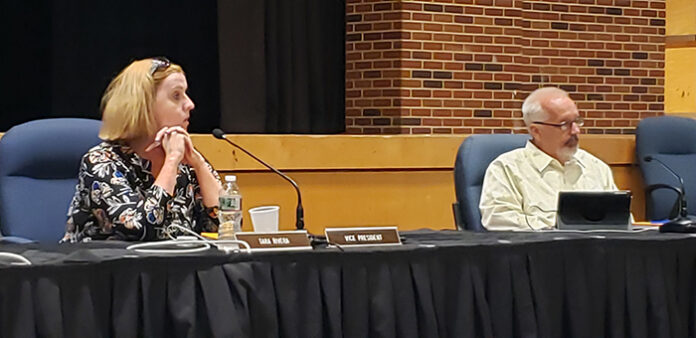
JACKSON – Board of Education members listened closely to a presentation by the school district’s director of food services Joseph Immordino about free lunch programs and changes to regulations by the state.
Immordino said the New Jersey Department of Agriculture will expand eligibility requirements for free and reduced cost meals which means that they increased the percentage along the poverty line. Last year it was 180% over the poverty line; this year it will be 200%.
Some families were not eligible for free and reduced meals because they made a few thousand dollars over what was allowed. Since the figures are going up, that family would then be eligible for the program.
There will also be a cost-of-living increase in the reimbursement rate which will help families in the districts have a reduced cost meal of lunch, and breakfast is free.
Board member Giuseppe Palmeri worried about the costs the district has to pay to accommodate these families.
“If we keep going into the red, we’re going to go deeper and deeper into the hole, what’s the plan?” Palmeri asked Immordino.
The 2018-2019 school year was said to be the first year that the school district experienced indirect costs to the program. The figure of $359,000 was the prominent number. “If you take the $359,000 number out and add it to the $168,000 that gives us a positive $250,000 as a ballpark,” Immordino said.
He added that due to COVID-19 “we effectively lost the last three months of revenue” since March of 2020.
“This indirect cost is going higher and higher, what exactly does that entail?” Palmeri asked the food director.
He responded that that increase is for payment to the district for various services such as custodial services to clean the kitchens, facilities personnel, plumbers or other technicians, trash and so on. “Anything that food services basically utilize as a service and providing back to the district,” Immordino answered.
“If your indirect cost continues to go up and the benefits of cost continue to go up you are going to be in the red every year, probably,” Palmeri said.
Immordino disagreed. “No, right now we are sitting on $1.3 million in profit that basically equates to the amount of money we have in our funds.”
Palmeri said, “that is from the subsidies over the last couple years due to COVID.”
Immordino said that the “$1.3 million was from this past year.”
“Because we were getting money from the government,” Palmeri responded.
Immordino agreed.
“Now that will stop or do you expect your profits will go up even without the government subsidies?” Palmeri asked.
Immordino said “the state and USDA only allows for us to have what is considered three months of operating expenses. So, what happens is by law that money belongs to the food district program. Also, by law food services is not permitted to take any money from the general fund so we are self-sufficient.”
“With regard to the three-month operating expenses, roughly $700,000 or $800,000 and we are double that so we will get a slap on the wrist (from the state) for doing such a good job,” Immordino added.
“What we need to do is defray our cost or our fund balance and the way to do that is to knowingly go into this next school year knowing we will suffer a loss and my estimation – which is difficult to gauge because of so many unknowns – is that we lose the $300,000 next year on paper. It is a paper loss,” he explained. “We will still have enough money in the fund to support everything that we need to do.
“There is a method to the madness, part of that we have to comply by some acquitted law that tell us that we can only have X amount of money in our coffers. The funds that we have are earmarked for food services specifically,” Immordino added.
He said, “our intention is to show a paper loss next year to bring down our fund balance. Jackson is not the only school district that shows such a high fund balance (and the USDA) doesn’t know how to address that yet.”
Immordino noted any corrective action required has already been discussed with the state “and they are okay with this.”
He acknowledged this was a short-term plan. “In a year we may have to raise the prices – as to what we have no idea.”






